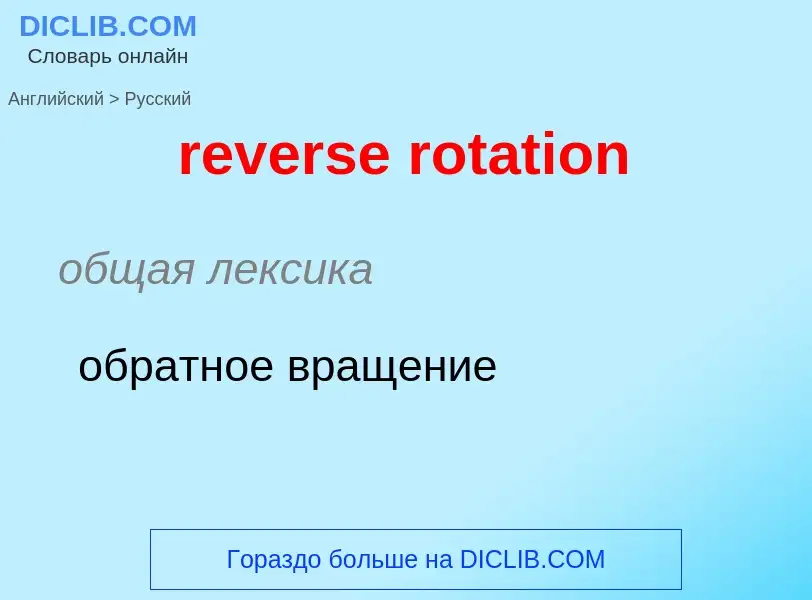Traduzione e analisi delle parole tramite l'intelligenza artificiale ChatGPT
In questa pagina puoi ottenere un'analisi dettagliata di una parola o frase, prodotta utilizzando la migliore tecnologia di intelligenza artificiale fino ad oggi:
- come viene usata la parola
- frequenza di utilizzo
- è usato più spesso nel discorso orale o scritto
- opzioni di traduzione delle parole
- esempi di utilizzo (varie frasi con traduzione)
- etimologia
reverse rotation - traduzione in russo
общая лексика
обратное вращение
[rəu'teiʃ(ə)n]
общая лексика
вращение
чередование
севооборот
ротация
смена (культур)
вихрь
вращательное движение
вращательный
кругооборот
кругообращение
периодическое повторение
поворачивание
поворот
ротор
собственное вращение
физиология
круговорот
строительное дело
угол поворота (сечений)
существительное
общая лексика
вращение
оборот
чередование
периодическое повторение
перемещение по кругу (кораблей в круговом ордере)
спорт
чередование игроков
военное дело
замена личного состава или частей
сельское хозяйство
севооборот
ротация
лесное дело
оборот рубки
гидрология
вихрь
Definizione
Wikipedia
In broadcasting, rotation is the repeated airing of a limited playlist of songs on a radio station or satellite radio channel, or music videos on a TV network. They are usually in a different order each time. However, they are not completely shuffled, so as to avoid varying the time between any two consecutive plays of a given song by either too much or too little. When measuring airplay, the number of times a song is played is counted as spins.
Stations playing new music typically have a short rotation of around four hours, while stations playing "classics" may go as long as eight hours, with a few stations promising "no repeats" where a song is not played again during a broadcast day to allow a much broader playlist (or if there is a purposeful repeat on that type of station, it ties into a station contest for a prize, such as tickets to the played artist's concert). College radio and indie radio stations sometimes have no particular rotation, only the music director's suggested lists for the disc jockeys, or are totally freeform radio. Broadcast automation systems handle a limited rotation quite well, in turn making voice tracking easy. Even if a live person is present, the automation system at commercial stations usually picks the music ahead of time out of the current rotation, thus the DJ becomes only an announcer.
Heavy rotation or power rotation is a list of songs that get the most airplay on a radio station. Songs in heavy rotation will be played many times in a 24-hour period. A reason for playing the same song more than once a day is that many listeners tune in expecting to hear their favorite song, and many listeners don't listen to the radio for extended periods of time. Prolonged listening to a station that places songs in heavy rotation can quickly become unpleasant; such stations are not well-suited for retail environments, where employees must listen for hours on end, and doing so can breed contempt for the music and create a hostile work environment.
A song placed in "lunar rotation" is one that is only played in off-peak hours, usually late at night. There can be various reasons for this, but such songs are usually not hits and are played because of the personal musical preference of the DJ or programmer, to avoid more stringent daypart-based regulations on music content or to fulfill a broadcasting obligation to carry programming that is not popular with audiences, such as Canadian content quotas or public affairs. (See also "beaver hour".)


![plane of orbit]] and [[axial tilt]] (for Earth). plane of orbit]] and [[axial tilt]] (for Earth).](https://commons.wikimedia.org/wiki/Special:FilePath/AxialTiltObliquity.png?width=200)



